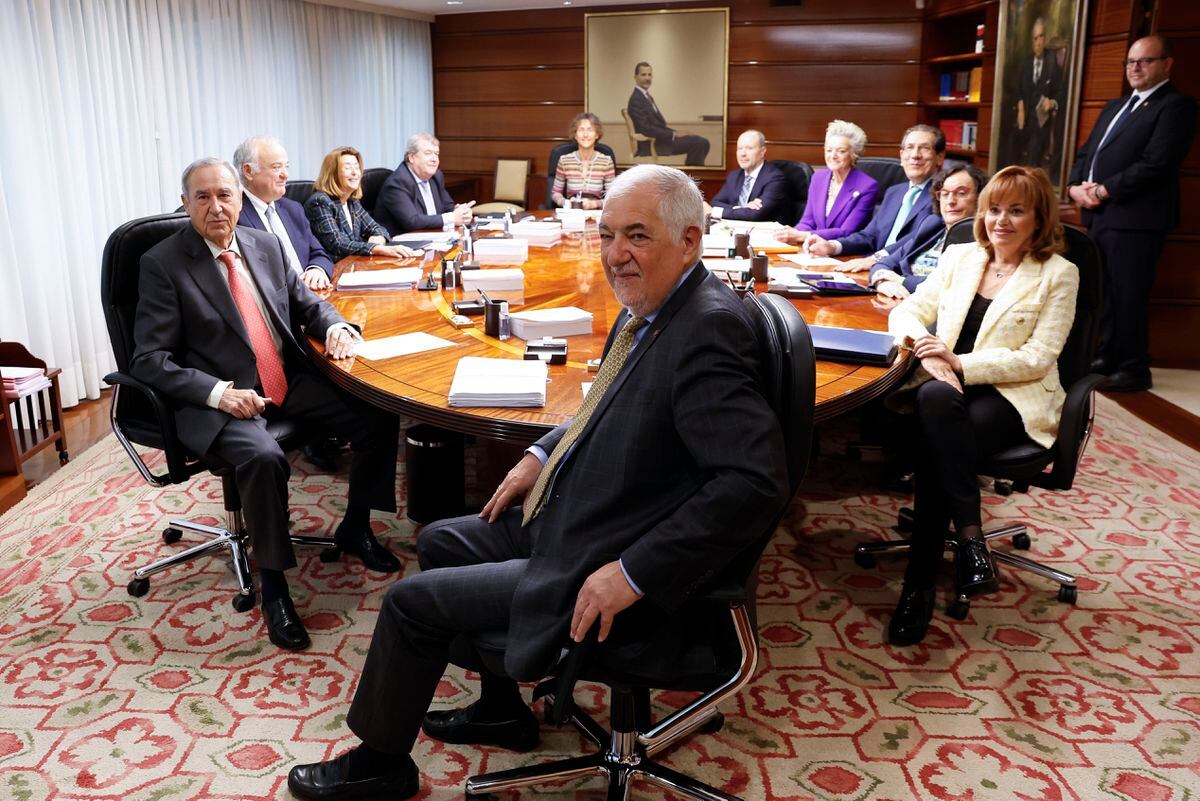The president of the Congress of Deputies, Meritxell Batet, this Tuesday in Congress Luis Sevillano / EL PAÍS
The urgency with which the parliamentary majority in Congress processes the bill to limit the powers of the Council of the Judiciary when, as now, it has an extended mandate, has maximized the institutional tension between these two powers of the State.
The Congress asked yesterday "respect" to the governing body of the judges before their request to reconsider the bill, promoted by the PSOE and United We Can, who consider the proposal an "interference" of the judiciary in the legislature.
PP and Vox study to appeal against the norm in Europe.
The first vice president of Congress, the socialist Alfonso Rodríguez Gómez de Celis, took advantage of yesterday's appointment at the Lower House Table to propose, outside of the order of the day, whether it was believed appropriate to give an institutional response to the agreement adopted on 21 January by the plenary session of the General Council of the Judicial Power (CGPJ) in which the Courts are called upon to reconsider their decision to process by urgent means, without listening to the Council or the judicial associations, the legal reform that will limit some of their competences, such as the appointment of judicial positions, when they are in office.
The Council ended its five-year constitutional mandate more than two years ago, but continues to make appointments to senior judicial officials because current law does not prevent making these appointments with the mandate expired.
In the absence of an agreement to renew the Council, the body maintains a conservative majority since it was renewed in 2013, when the PP ruled with an absolute majority.
The majority of the Board of Congress formed by the three components of the PSOE and the three of United We can, in front of the two representatives of the PP and that of Vox, to reply to the Council of the Judiciary.
The Board understands that it is the governing body of Congress competent to defend the Legislative Power and that, according to article 93.1 of the Chamber's Regulations, the processing of this modification of the organic law of the Judicial Power can be done through the procedure of urgency.
The two parties that make up the current majority of the Table (PSOE and United We Can) included in the response to the Council some clarifications not minor about the distribution of powers in a rule of law.
In their final point they specified: “Congress exercises this power in accordance with the provisions of the Constitution, which recognizes the General Courts as the representative of the Spanish people, as the seat where the pluralism of our society is manifested and its general will is expressed. , without this Table being responsible for other actions in the legislative procedure than fulfilling the functions assigned to it by the Regulations of Congress, respecting the deliberations and decisions adopted in the Chamber and urging the same respect of any other bodies in the exercise of the functions that may be attributed to them by the laws issued by the Courts ”.
The mention of the Table of the Courts to request "respect" for its powers and tasks from the Judicial Power is the key to the response and what immediately caused controversy between the parties.
The PSOE spokesperson, Adriana Lastra, recalled this in her speech during the Board of Spokespersons and before the press: “The power of the State is held by the Cortes Generales and in no case are they obliged to request prior reports or appearances from the Council of the Judiciary ”.
Gerardo Pisarello, a member of the Table for Podemos, described as "barbarity" what he took as an attempt by the Judicial Power to "limit the autonomy" of Congress and the division of powers and argued that what the legal modification now seeks is "to end with a constitutional anomaly ”by allowing a party —in allusion to the PP— to block the renewal of that judicial body for years.
The members of the Judiciary who promoted the plenary session on January 21 consider that, after this response from Congress, the governing body of the judges can no longer propose new initiatives to try to get the two government partners to change their minds.
One possibility that they handle in the medium term in the Council, according to the sources consulted, would be to present before the Constitutional Court a conflict between constitutional bodies, a figure that reserves to the Constitutional the competence to resolve controversies between the powers of the State.
But this initiative cannot be adopted until the legal reform is approved, so some members are in favor of studying the feasibility of this option if the Law goes ahead.
Other members consulted doubt that the express reform fits into the conflict between constitutional bodies, intended for when one body considers that another has assumed one of the powers that the Constitution reserves for it.
Some members of the plenary session chaired by Carlos Lesmes consulted by EL PAÍS trust that the express reform will be denounced before European organizations.
Several members came to propose in conversations held in recent weeks that the Council should be the one to bring the reform to Europe, but it was finally discarded due to the doubts that the institution itself would get involved in the process generated.
The most belligerent members of the conservative wing have already pointed out the possibility that the reform may end up being denounced before European organizations by a judicial association or party, which is the option that the PP is now studying, according to sources from the party's leadership.
Resources under study
The popular ones are going to assess the possibility of appealing the action of Congress before the Venice commission, which depends on the European Union, but they will not do so until the reform is definitively approved in the plenary session of the Lower House, a scenario that is expected by mid-March.
The European Commission for Democracy through Law, known as the Venice Commission, is the advisory body of the Council of Europe responsible for providing legal advice on constitutional issues that promote respect for fundamental rights among its member states.
Members of the Popular Party were last week in a meeting in the Council of Europe and already exposed their position contrary to the norm that is being processed in Spain.
The Commission has anticipated that it is following this case closely.
The PP spokeswoman, Cuca Gamarra, yesterday questioned the "urgency and no guarantees" procedure carried out by the PSOE and Podemos in the face of such a serious issue.
Gamarra avoided ruling on the merits of the matter and that a General Council of the Judiciary in office could continue to promote appointments.
Gamarra even declared that the claim of the PSOE and Podemos "threatens to deteriorate the democratic quality of Spain" because it represents "a dangerous interference in the separation of powers."
The PP critically compared the speed with which all this reform has been processed in a few weeks against the slowness with which opposition initiatives are addressed.
"I have no doubt about the separation of powers, but also that it is necessary to legislate with quality and without interference from another power and to do so within the European framework," said Gamarra.
Echenique warns: "I would change the election mechanism"
The PSOE and Unidas Podemos registered last October a much more ambitious and controversial bill than the current one under discussion.
They did it to pressure and force negotiations with the PP to renew the General Council of the Judiciary, which has had its mandate extended for two years.
In that project, the two parties of the coalition government proposed a whole change of method in the election of the 12 judicial members (of the 20 that make up the Council): instead of requiring the support of three-fifths of the Chamber, it was proposed his election by absolute majority.
PP, Ciudadanos and Vox strongly rejected that reform attempt and also took their complaints to Europe and the Venice Commission, which monitors compliance with the principles that govern the rule of law.
The President of the Government, Pedro Sánchez, offered a few weeks later to the leader of the opposition, Pablo Casado, to withdraw that initiative in exchange for resuming the renewal of the Council.
And indeed that proposal, already registered, was paralyzed.
There it is still deactivated, although the PP does not offer any sign of wanting to negotiate the renewal.
The spokesperson for United We Can in Congress, Pablo Echenique, yesterday wanted to add more pressure and warned: "My opinion is that at some point we will have to modify that mechanism, obviously yes."
Echenique justified his position in that the current election system was designed to guarantee plurality in the Council in times of bipartisanship, but the Podemos spokesperson understands that that time is over.



/cloudfront-eu-central-1.images.arcpublishing.com/prisa/GT6J24YGC5GBVOM5TDKKIAZZDY.png)



/cloudfront-eu-central-1.images.arcpublishing.com/prisa/OCXVGAGDFFE6NDRQIKWRK26LLU.jpg)


/cloudfront-eu-central-1.images.arcpublishing.com/prisa/2C5HI6YHNFHDLJSBNWHOIAS2AE.jpeg)




